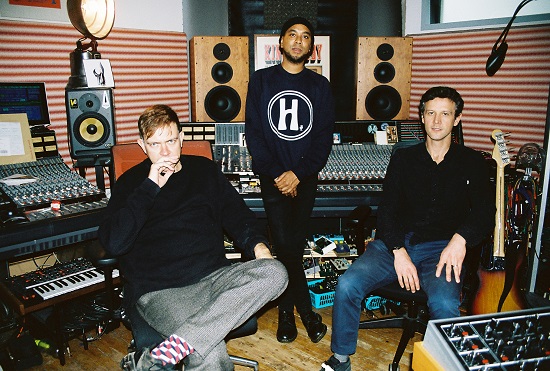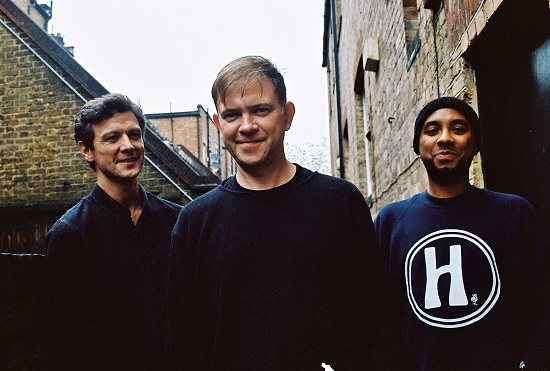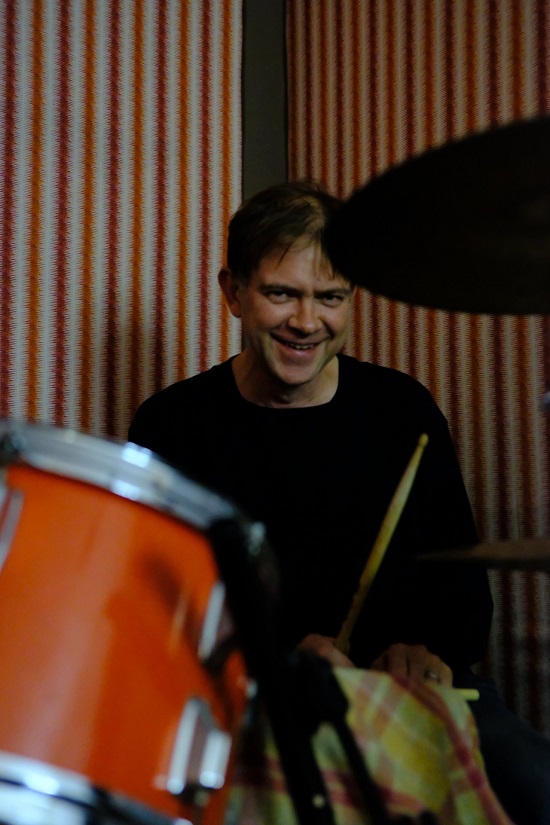All photos by Holly Whitaker
In February, Dan Carey of Speedy Wunderground was named Producer of the Year by the Music Producers Guild. It’s a prestigious prize, but really just represents mainstream recognition of something that those au fait with Britain’s dynamic new wave of young indie musicians have been aware of for a while – that Carey is one of, if not the most pivotal figure in a movement that feels genuinely generation-defining. Speedy Wunderground’s seven inch singles series, where he and a band record a track in one day with minimal takes and as few overdubs as they can, which is then mastered, pressed and sold on a run of 250 copies as soon as humanly possible, was the launching pad for Black Midi, whose Carey-produced Schlagenheim became one of the most important leftfield successes of 2019, for Black Country, New Road, who are perhaps the most exciting band in the UK, and for Squid, who have just signed to Warp Records following a bidding war and whose debut album Carey was due to start recording this week. Judging by the quality of their early output, the likes of icy, thumping dance trio PVA, heavenly guitar-psych project Tiña, and the astonishingly talented poet-musician Sinead O’Brien will be next to make the leap.
He’s been working in music for decades, from his time in guitar bands in the 1990s to a shortlived major solo deal with Virgin Records who were searching for a Moby-esque producer-cum-popstar, to playing on dub reggae recordings (he still cites King Tubby as his favourite producer), to writing pop hits for superstar Sia, but Speedy Wunderground ranks among his most important achievements. “Um, well, for the last couple of years I have had this feeling of ‘things are going well’,” laughs Carey a little sheepishly over the phone, “but I didn’t think that an organisation like [The Music Producers Guild] would recognise it. I suppose what I feel happy about is that to receive attention like that from various places, I haven’t had to compromise. I’m still making the exact music I would make whatever the situation. I haven’t done something outside of what I want to do in order to get attention.”
Seven years since the first Speedy Wunderground release, by Steve Mason and Emiliana Torrini, the label has become genuinely prestigious. It is not ridiculous to wonder whether one day it will be looked back upon with the same reverence as predecessors like Factory, Sarah, Zoo or Creation receive today. Much of his work is now taken up by sifting through the masses of musicians who want to get involved, but that’s a positive. “If you get sent a lot of stuff, and you pick the best of it, it’s gonna be quite good!” Although the ongoing coronavirus crisis has enforced a break in his plans, he’s excited for the imminent next phase, Speedy Wunderground’s move towards full length album releases. His own band Scottibrains are planning an album for early next year, as are Tiña, whose upcoming full-length will be the first Speedy Wunderground LP.
Working out of his home studio during the lockdown, Carey’s keeping busy. “I’m just trying to get on with experimenting at the moment,” he says. Under his alter-ego Savage Gary he’s been putting out a new run of digital singles called the Quarantine Series, where he sends different beats to different collaborators, so far the likes of Kate Tempest, PVAs Ella Harris and newcomers like Heartworms, and asks them to record vocals over the top. (You can hear the latest, ‘A Letter To Brian Eno’ featuring Warmduscher’s Clams Baker premiering exclusively via tQ above). “It just occurred to me that if I’m stuck, because I happen to have the studio at home, I might as well do something,” he says, “but also, music that’s made very immediately in a particular period of time is going to have a flavour that’s determined by the way everyone feels. There’s no way that these songs would have been written if we weren’t all locked in our houses and you can hear that coming through in the words. It’s been pretty claustrophobic and dark so far, but I might just try to make something that’s more optimistic next. I met this guy who lives on a mountain outside Reykjavik who makes really tropical and sunny kind of music, he said he just made it to warm himself up!”

Speedy Wunderground’s Dan Carey, Pierre Hall and Alexis Smith
From home he’s also put out the latest single by his own band Scottibrains, complete with footage recorded remotely by all four members in isolation. Originally they were plotting a video which involved them hijacking a train with lasers and a smoke machine and blasting the track through the on-board PA, but they were forced to improvise. “I couldn’t make the split screen work properly, so it all looks wonky and really demented,” he laughs. “Liam [Hutton] did his early in the morning, pretty straight, I did mine in the afternoon with the smoke machine and lasers, and then Beth [Buxton] was absolutely smashed, crawling around the floor in the middle of the night, so it looks really weird.”
Even in lockdown, it’s Carey’s love of the immediate that is his greatest creative strength. The defining rule when recording a Speedy Wunderground single is that everything has to be completed within a day, most of which is spent setting everything up to get the sound exactly right. “My least favourite thing in the whole world is being in a studio with a band playing take 25 of a song. It drives me mad, and it never gets better,” he says. When he’s working on a Speedy Wunderground release, he makes a rule that the artist cannot go beyond a third take. More often than not, they get it in one. “The first take always has this slightly startled quality to it.”
In the course of my job at The Quietus, I’ve interviewed a number of artists who have worked with Carey, and all of whom were at pains to sing his praises, whether or not they were asked about him. “We thought ‘fucking hell! This is intense!” beamed Squid’s Louis Borlase of the time Carey suggested they speed up their single ‘The Dial’ by 10bpm, when I asked them last year which moments in their career they look back on as the most pivotal.
“It’s bizarre, it’s amazing,” Sinead O’Brien told me of recording her latest EP. “There’s so few words exchanged when we’re in the studio, but I have a really, really, really deep connection with Dan.”
Carey’s approach reflects his quick creative spirit, but also his compassion. The reason he brings the best out of his artists is as much through his skills with people as through his skills with the studio. “If you’re made to do something 20 times and keep correcting it, and someone spends ages editing it, you start to feel like you must be deficient in some way. I think I make people feel that they’re ready for it. If I go on to do an album with them that continues, and if they go off and do an album somewhere else they can retain that feeling that it should be fun, and they’re really good at it,” he says.
He recalls his first experience in the studio aged 13, when he’d saved up his pocket money to record his teenage prog-rock tunes, as the opposite. “One song was about fifteen minutes long and it had this massive guitar solo in it that went on and on and on. I remember the guy mixing it, we were all listening to it on the desk and he put on some headphones. The song of ours he was mixing finished and he was still on his headphones. I tapped him and he was like ‘what?’ and it turned out he was just listening to something else, while he mixed our tune. It was terrible, to be fair, the music was probably awful, but I got home and listened to it and everything was wrong. I cried.”

Perhaps Carey’s main talent is choosing who he works with. He’s only ever abandoned one Speedy Wunderground single, an early, ill-advised cover of Beastie Boys’ ‘She’s Crafty’ by an artist he won’t name that was binned by mutual consent. “There’s often an industry certainty that things are going to ‘be massive’ before they’ve even come out. I’ll occasionally get presented by something, and someone will say ‘you really need to work on this, it’s going to be massive’, and I’ll immediately think ‘no way!’ I get offered things that might be tempting for a minute, but then I’ll think ‘that’s not the right move’.
“I get put off when I feel that something’s not genuine. If I’m asked to work with a band and I don’t feel they’re doing it for the right reasons, that puts me off.” What does he consider ‘the right reasons’? “That you’re using the platform you have to communicate something that you really feel needs to be said. Not necessarily a political statement, it can be personal, the ideas can be abstract, but you need to be using the system of releasing music as a genuine channel of communication. For example [frequent collaborator] Kate Tempest, she needs to tell people what she’s thought of. A band like Black Midi need to communicate a feeling that they can’t do without expressing, and seeing people absorb it.” Any attempt to piggyback off another band’s success, or to imitate what’s gone before, Carey says, is the wrong reason.
It is perhaps Black Midi’s unlikely rise to mainstream acclaim that has most put Carey on the map. The group’s debut single, the lumbering, head-mangling masterpiece ‘bmbmbm’ was the 24th entry in Speedy Wunderground’s singles collection, and Carey went on to helm their debut LP Schlagenheim “Red Dead Redemption 2 had come out and they were all obsessed with that. That was most of what they talked about,” he remembers of the sessions. “They’re very quiet and interesting guys, sometimes in between takes Geordie [Greep, Black Midi frontman] would say something like ‘I went to a Bach organ recital last night’ and start experimenting with different modes.
“The force with which they would play was absolutely unbelievable,” he continues. “It was so intense and so loud and so complex, it was like the room was a different colour when they played each song.” Carey’s abilities to bring out the purest, rawest iteration of a band’s presence proved the perfect match for the foursome’s genuinely staggering musicianship; Carey played no small part in making sure Black Midi’s unbelievable chemistry and potency as players transferred to record. The same can be said of the way Squid’s wonky-sharp cool feels so front-and-centre on their releases, or Black Country, New Road’s edginess and brittleness, or Sinead O’Brien’s hypnotic charisma. It’s hard to attribute a certain ‘style’ or sonic fingerprint to a Dan Carey recording other than his insistence on urgency and authenticity, and in many ways that’s his genius.



